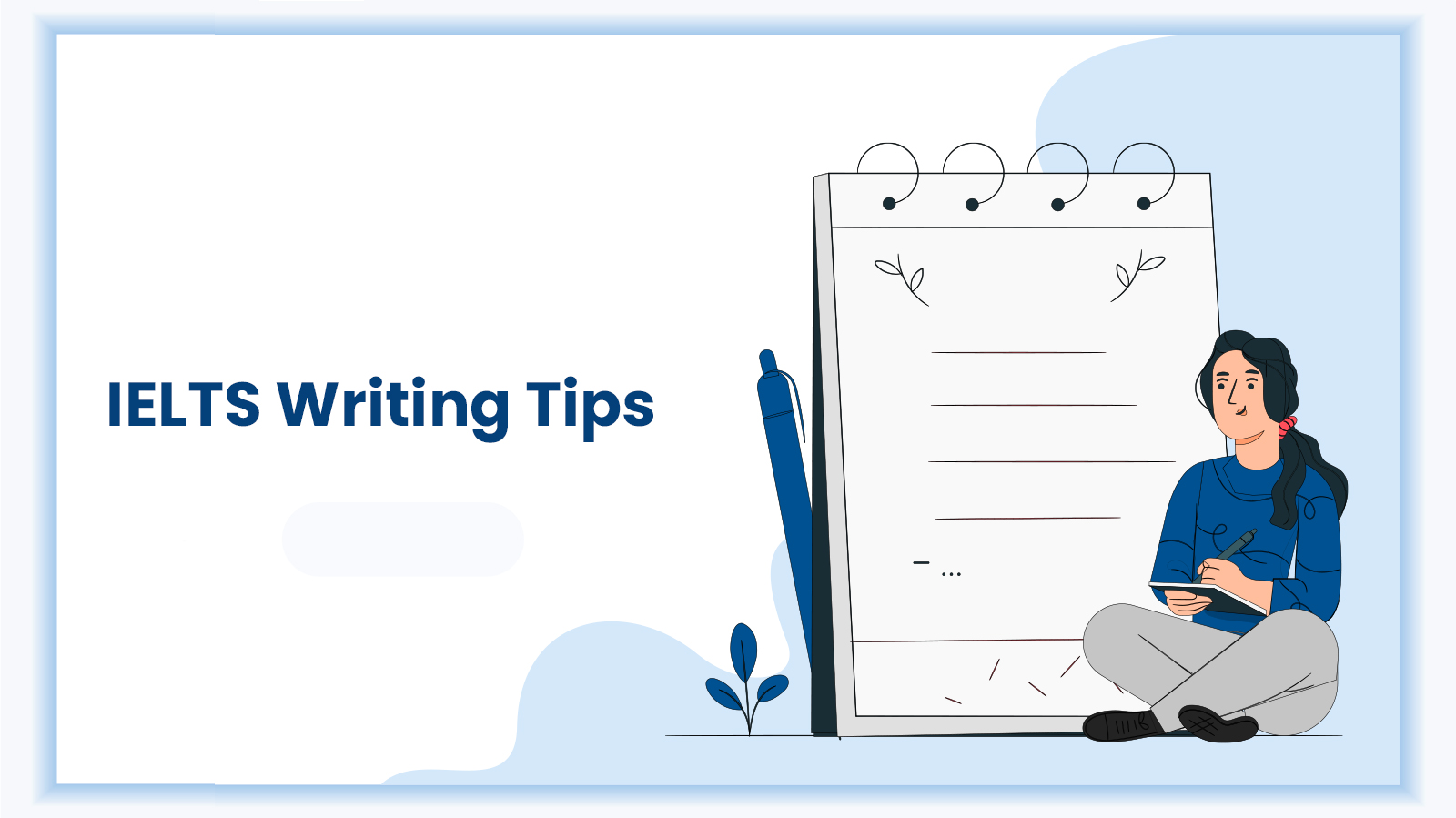In this blog, we will discuss 10 IELTS Writing tips to help you score better. But before going through the tips, first learn a bit about the IELTS writing exam.
The IELTS writing exam doesn’t see your complexity or use of big words. It checks your accuracy and expressions. If you use simple sentences but express your ideas articulately, and are grammatically accurate, then you can get a high band score as well.
What is the IELTS Writing test?
There are two types of this writing exam – the IELTS Academic Writing test and the IELTS General Training test. Generally, graduates and postgraduates go for the IELTS Academic Writing test. On the other hand, the IELTS General Training test consists of topics designed for those who will face an English-speaking environment.
This English writing exam consists of two writing tasks. Let’s discuss the writing parts in the wake of these two types of exams.
Writing Task 1
This task comprises 150 words, whether it’s academic or general training exam type. Weightage-wise, it has one-third of your band score. We will understand the tasks according to exam types:
General training test:
You will be asked to write a letter based on a situation mentioned in the IELTS writing exam. Some common topics can be a letter to a friend, a complaint to any company, or a request to any company.
Academic writing test:
You have to write after looking at and analyzing a graph, chart, or diagram in your own words. Use a formal style while writing this task.
Writing task 2
This task is the same for both test types. You will be given a statement or premise. You have to write a formal essay in your own words. The length of the essay should be 250 words or more. This task carries two-thirds of your band score.
How is the marking done in the IELTS writing exam?
Knowing about marking areas will help you to focus on the right areas. The IELTS writing exam checks four criteria:
- Task completion- whether you have completed the task
- Coherence and cohesion- if you have tied the thoughts together and how well it is organized
- Accurate use of vocabs and its range
- Grammatical accuracy and its range
Each area is scaled from 1 to 9, where 9 is the highest.
10 IELTS Writing tips:
1. Read the question carefully
Ensure that you have read the question so that you answer correctly. If you don’t understand the question, then you won’t be able to achieve the task. Read the outline twice and cover all the points mentioned. For instance, you may have to give pros and cons plus examples. If you leave any one of these, you won’t get a score for the missed part in the IELTS writing exam.
So, address all the parts asked in the task with relevant answers and examples.
2. Be articulate
Try to be as clear as you can. Articulation is vital as the examiner will check whether you have clearly expressed your ideas. Be practical and use your best knowledge of the topic. Don’t be afraid if you leave some topic. You just have to be clear and articulate when you give your explanation. Don’t worry if it is not the best explanation.
3. Beware of the assessment criteria
You should know how the marking is done. After you have a clear idea about the marking scheme, focus on how to prepare and find your strengths and weaknesses.
This will also help you to understand what the examiner wants to see in your answer. So, scoring higher will become easier on your IELTS writing exam.
4. Try to be coherent
Don’t deviate from the main topic. Also, try to link all your ideas together. Don’t include any irrelevant information and avoid redundancy. Keep revising the para that you have just written. This way, you can link your paras together and stay coherent.
Also, don’t use too many words i.e., not more than 200 words in task 1 and not more than 300 in task 2.
5. Choose the proper writing style
You should be aware of when to use formal language. The formal tone or language is professional or academic. Whereas, the informal tone is friendly and casual. Even if you’re using an informal tone, avoid slang in this English writing exam.
For the academic writing test, use a formal tone for both tasks. But for the general training test, use formal for task 2. The tone for task 1 for general training depends on the situation, which may be informal or formal.
6. Plan before you write and revise
When you have understood the topic well, the next step is to plan what you will write. You should plan what to write in each paragraph. Create a simple outline of your ideas. This will also help you to follow the standard structure and be coherent and logically organized.
For task 2, the commonly used structure starts with an intro, then the main ideas, and ends with a conclusion. For task 1, you should start with an intro, then give an overview, and finally put some detailed ideas.
Apart from these, plan your time as well before starting the IELTS writing exam. Don’t spend too much time on task 1, so you have enough left for task 2. Remember that task 2 is twice as worth compared to task 1. Since you have 60 minutes to write your test, keep 20 minutes for task 1 and 40 minutes for task 2.
7. Don’t write memorized or model answers
If you write memorized answers, you get a low score. Also, you may not get the essay that you have memorized. Memorizing essays makes your preparation too hard for you.
Instead, focus on your vocabs and practice by writing on various topics. Read magazines, newspapers, and books to enhance your vocabs. In this way, your writing skills will improve.
8. Pay attention to punctuation, grammar, and vocabs
Learning how to put correct punctuation in a sentence is an important writing tip. It also helps to make the answers more understandable. If you are not sure about the use of any punctuation marks, it’s better to avoid them.
Try not to make any grammatical errors. Keep your sentences simple and clear. Remember that grammar is a criterion for assessment.
If you don’t know the meaning of any word, don’t use such words. There is a high chance of making mistakes.
9. Don’t use too many complex sentences
There should be a proper balance of simple and complex sentences. Use simple sentences more. Break the sentences to make the ideas comprehensible and easier to read.
On the other hand, if you want you can include some complex sentences. But avoid using too many of them in your writing.
10. Include your friends
Get a study buddy to help with your preparations. If you have someone who is also preparing for the IELTS writing exam, then it’s better. You can study together and help each other. Give each other feedback or correct each other’s mistakes. Besides, you stay focused and won’t skip your daily preps.
Conclusion
Getting a higher band score is not tough if you prepare well. Don’t hesitate to ask your friends and colleagues to help you with your preparation. We hope that practice plus these tips will help in your journey to ace your IELTS writing exam.
After going through these tips, you have gained some insight into this exam. If you want to take your preparation up to the next level, then we can offer you help. DG Training is the leading training institute in Dubai that offers the best IELTS course in Dubai. Get in touch with us for more details.
If you want to maximise your overall IELTS band – Checkout our dedicated blogs on IELTS Speaking Tips and IELTS Listening Tips.
FAQs
In the academic test, task 1 asks you to write a report based on a graph, diagram, or chart. Whereas, in a general training test, you are asked to write a letter.
Know All About IELTS for more information about the test types.
No, both exams are marked in the same way. Marking criteria are the same for both.
Yes, of course. So, try to avoid any spelling mistakes. Both the American and British spellings are allowed.
For more IELTS preparation tips, visit Top IELTS Listening Tips & Strategies To Improve Your IELTS Score.
Avoid slang, contractions like can’t, won’t, etc, cliches. Also don’t use the same words repetitively.



